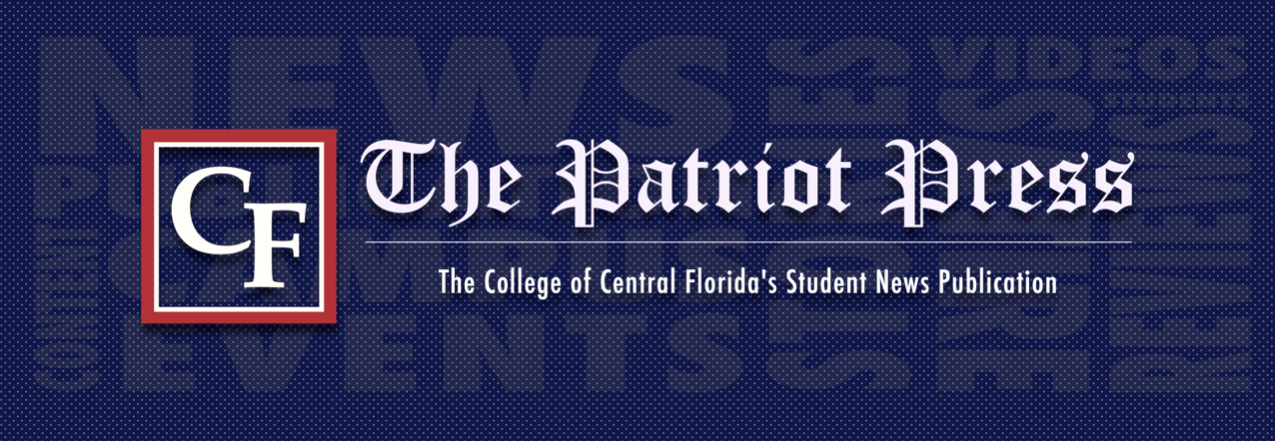Diversity, Equity & Inclusion: The Faculty Perspective
Previously, the Patriot Press shared student reactions to the removal of Diversity, Equity & Inclusion (DEI) at the College of Central Florida. For this article, the Patriot Press reached out to many CF employees for comment. Most declined to comment.
The majority of faculty speaking out in support of DEI teach in fields that may be affected by this legislation, namely in history, humanities and the arts.
“I am proud to be American, proud of Western democracy, and proud to be a civil servant in an imperfect union,” said Professor Wendy Adams of CF’s Humanities & Social Sciences department. “Our country has not lived up to [its] ideals fully since its founding, but we continue to do better – to progress – and I am proud of that.”
Adams went on to emphasize the importance of DEI to continuing this social progress.
“If we as a country – we as CF Patriots – truly want to live up to our founding ideals, the continuation of diversity and inclusion programs and initiatives is absolutely essential to our success,” said Adams. “I am deeply saddened by much of what is going on in our Florida education system right now.”
Of faculty interviewed, those opposed to DEI tend to work in largely unaffected fields, like math, science and business.
“For me, [the removal of DEI] is pretty much inconsequential because that’s not part of the instruction,” said Associate Professor Mark Davis of CF’s Business & Technology department.
Davis expressed his concern that discussing topics like those described in SB 266 could be harmful to both the students and the professor.
“The role of an educator is to educate,” said Davis. “Once you cross that line where you start injecting your opinions and beliefs into something, it crosses the line from education to indoctrination. … I think it’s a little bit inappropriate because students tend to want to please the professor, and if they think you believe a certain way from a personal standpoint, they’re likely to try to accommodate that for the sake of their grade.”
Davis gave the example of a Human Resources course, in which students might have polarizing opinions about the legislation being discussed.
“They are equipped with the knowledge of the law, not what Professor Davis thinks about the law,” said Davis. “My opinion of the law is irrelevant to the law itself.”
What’s happening in Tallahassee
Like many other Florida state colleges, CF has been taking steps toward removing any mention of DEI from its campuses and websites.
This follows the Florida College System’s January statement pledging to remove DEI in compliance with the proposed House Bill 999 and Senate Bill 266, which would affect state funding to Florida colleges and universities.
SB 266 has since been rewritten to not specifically mention DEI, but it would still prevent Florida colleges and universities from discussing any “theories that systemic racism, sexism, oppression and privilege are inherent in the institutions of the United States and were created to maintain social, political and economic inequities.”
The bill would also ban any major or minor course of study that relates in any way to “Critical Theory.” This could affect fields like gender studies, criminal justice and the arts.
If passed, these bills would be effective July 1.
The impact on college faculty
The bills also establish new restrictions on college and university faculty, both in the hiring and accreditation process and in the classroom.
Professors could lose tenure for discussing any of the above topics, and they would be unable to go through arbitration or an appeal beyond the school’s president.
Tenure is a protection awarded to permanent faculty at a college or university. It signifies job security and encourages academic freedom.
While the College of Central Florida does not have tenure, its continuing contract process offers similar protections.
Although the legislation is not yet active, its impact is already being seen. One professor at Palm Beach Atlantic University had his teaching contract terminated in March. In an Instagram post, he alleges this was due to his “decision to teach and speak about racial justice.”
Supporters of DEI are concerned this legislation will lead to widespread censorship in the higher education system. If certain topics and programs are defunded or banned in public Florida’s colleges and universities, hundreds of faculty members could lose their jobs.
Opponents of DEI argue these topics do not belong in the classroom in the first place, as they can become overly opinionated. An official news release from Governor Ron DeSantis calls these “the tactics of liberal elites who suppress free thought in the name of identity politics and indoctrination.”
Want to share your thoughts on Diversity, Equity and Inclusion at the College of Central Florida? Please contact us at [email protected].
Your donation will support the student journalists of College of Central Florida. Your contribution will allow us to purchase equipment and cover our annual website hosting costs.

Elora Pfriender is the current editor-in-chief of the Patriot Press. She is pursuing her BA in Writing & Rhetoric at UCF online, but she also takes...



